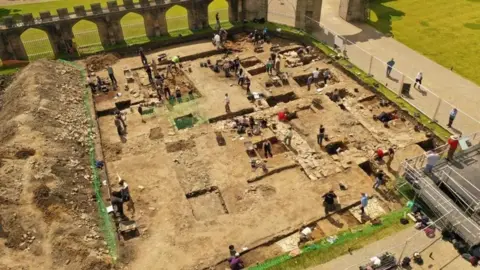Wearside stories you may have missed
 Laura Hagan
Laura HaganA giant landslip, hope for glass-making in Sunderland and an archaeological find.
Here are some stories you may have missed on Wearside this week.
Giant section of cliff falls in landslip
A large section of cliff has crashed on to a beach in a landslip.
Eyewitness Laura Hagan saw the rocks come down at Seaham Hall beach, near Ryhope in County Durham, at about 10:00 GMT on Tuesday.
She said: "Nobody would stand a chance in there. A lot of families and children go into the caves but don't realise how dangerous and unstable the cliffs are."
Durham County Council said coastal engineers were visiting the site to assess the area.
At-risk university staff 'gagged', union says
 Google
GoogleStaff at a university undergoing a restructure are not allowed to tell colleagues their jobs are at risk, a union has said.
The University College Union (UCU) said management at the University of Sunderland "forbade" the affected staff from having discussions about the potential redundancies with "students, alumni or colleagues".
The university confirmed a consultation on "minor structural changes", which might impact two members of staff, was under way.
A spokesperson said those involved had been asked not to "communicate widely" about the changes, but neither staff member had "raised any issue" with the request.
Hopes city's glass heritage saved with new centre

A city's glass working heritage is to be secured through the creation of a new £5m centre dedicated to the art, the government has announced.
Glass-making has been carried out in Sunderland for 1,350 years but there were fears this would end after it was announced the National Glass Centre would close in 2026.
But Labour Culture Secretary Lisa Nandy said the government was investing in a new site called Glassworks: Sunderland, as part of a £60m fund for creative industries.
Chief executive of Sunderland Culture Nik Malyan said the existing glass-making centre was not financially stable and the new site would safeguard "the craft, the skills and the art form".
Uncovered 1650s house captures 'a moment in time'
 Alexander Jansen/Durham University
Alexander Jansen/Durham UniversityA house which lay buried for almost 400 years reveals an insight into life in republican England, archaeologists say.
The mansion, at Auckland Castle, in Bishop Auckland, County Durham, dates back to about 1650 and was built by Sir Arthur Haselrig, who was a key ally of Lord Protector Oliver Cromwell.
But just 10 years later, the monarchy was restored and when the new Bishop of Durham John Cosin took over the castle, the house was demolished.
"It just sat there for 400 years without anybody having any real idea about the fact that it was there," the project's academic lead Prof Chris Gerrard said.
Follow BBC North East on X, Facebook, Nextdoor and Instagram. Send your story ideas to [email protected].
